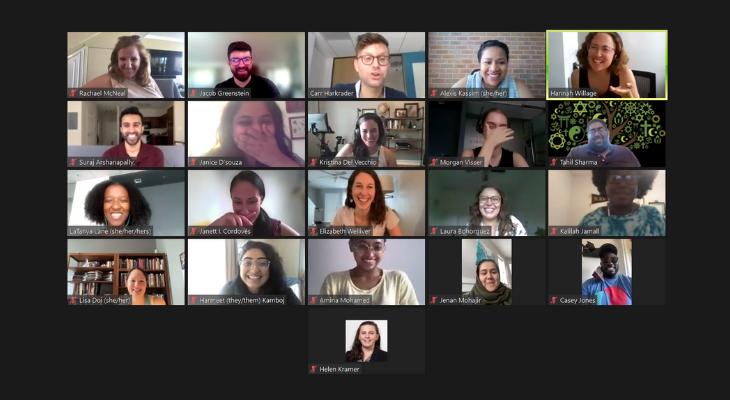Interfaith Leadership Institute 2021: A Reflection
August 13, 2021

As with everything nowadays, there’s a meme for 2021: “Kinda tired of living through unprecedented times. Precedented would be fine with me.” The images behind the caption change depending on which version of the meme you see, but the feeling is the same: it’s an unusual time out there, to say the least. The past year and a half has been exhausting, uplifting, reflective, terrifying, and inspiring … depending on what time of day you ask me.
But there is no denying that the world is changing, and, if there was a clear theme from this year’s Interfaith Leadership Institute, it is that it requires new leaders to shape that change. Over 300 participants attended this year’s virtual event and attended trainings focused on everything from the foundational concepts of interfaith leadership, to catalyzing campus change, to examining the role racial and political divides play out in interfaith work.
Speaking to them at the opening plenary, Kelly Corrigan, a writer and podcast host, referenced the Rev. Dr. Martin Luther King Jr.’s comment that a budget is a moral document. Expanding on the theme, she noted that a to-do list is a moral document as well; it highlights and prioritizes what needs to be done. While at first I shuddered at the moral implications for my own personal, ever-expanding to-do list (I promise to actually do laundry … at some point), it was the national implications of her metaphor that resonated with me.
The United States has a long to-do list right now, including addressing racial inequities, political polarization, and economic disparities. And, most obviously, at the top of that list is saving the lives of thousands of people by distributing the COVID-19 vaccines. What can—and what are—interfaith leaders doing to address that issue?
Our closing plenary speakers offered some needed insight to that issue. Javaria Haseeb traced how what she learned as a Muslim interfaith leader at a Catholic college translated directly to fostering an inclusive vaccine development team at Pfizer, where she works as senior associate scientist. She noted that “science is all about teamwork,” and that building relationships—perhaps the core part of interfaith leadership—is essential to everything they do as a team. The Rev. Dominique Grate, pastor at Trinity AME Church in (as he put it) “rural, rural, rural South Carolina,” echoed that in his emphasis that the trusting bonds between faith institutions and their members was vital in convincing his congregants to receive the vaccine.
Over the past year, we’ve become used to waiting for Zoom rooms to open or wifi connections to stabilize or, yes, even for our greatest thoughts to be captured by memes. But the 2021 ILI was a reminder that the tangible work of interfaith leadership is essential—whether over a computer screen or a classroom desk. These unprecedented times are becoming more and more precedented, but the students and educators at the ILI are responding with an increased commitment to the foundations—on and offline—of interfaith engagement.
Share
Related Articles



